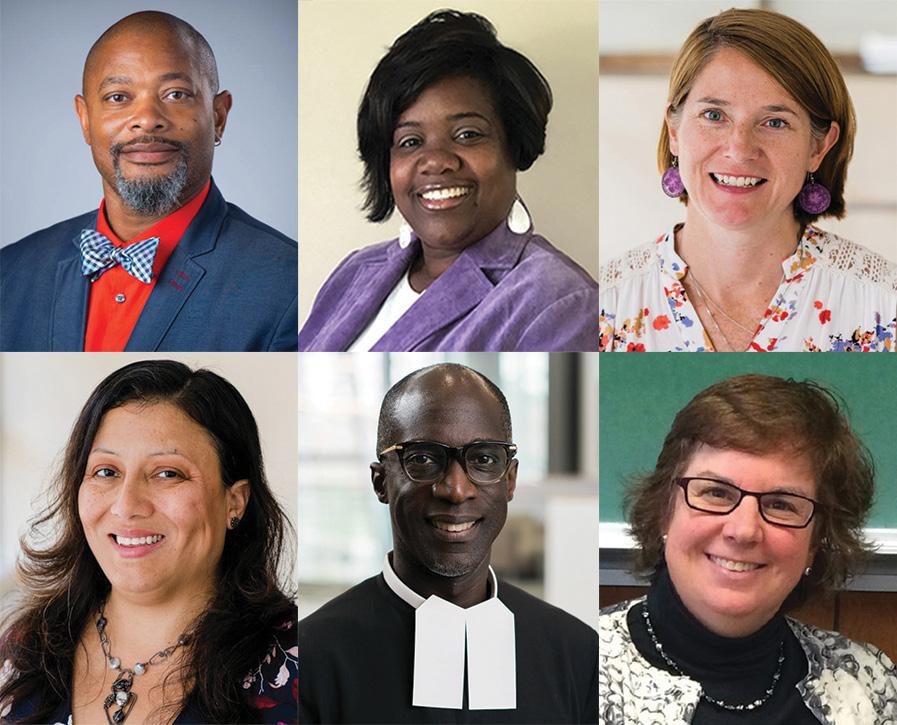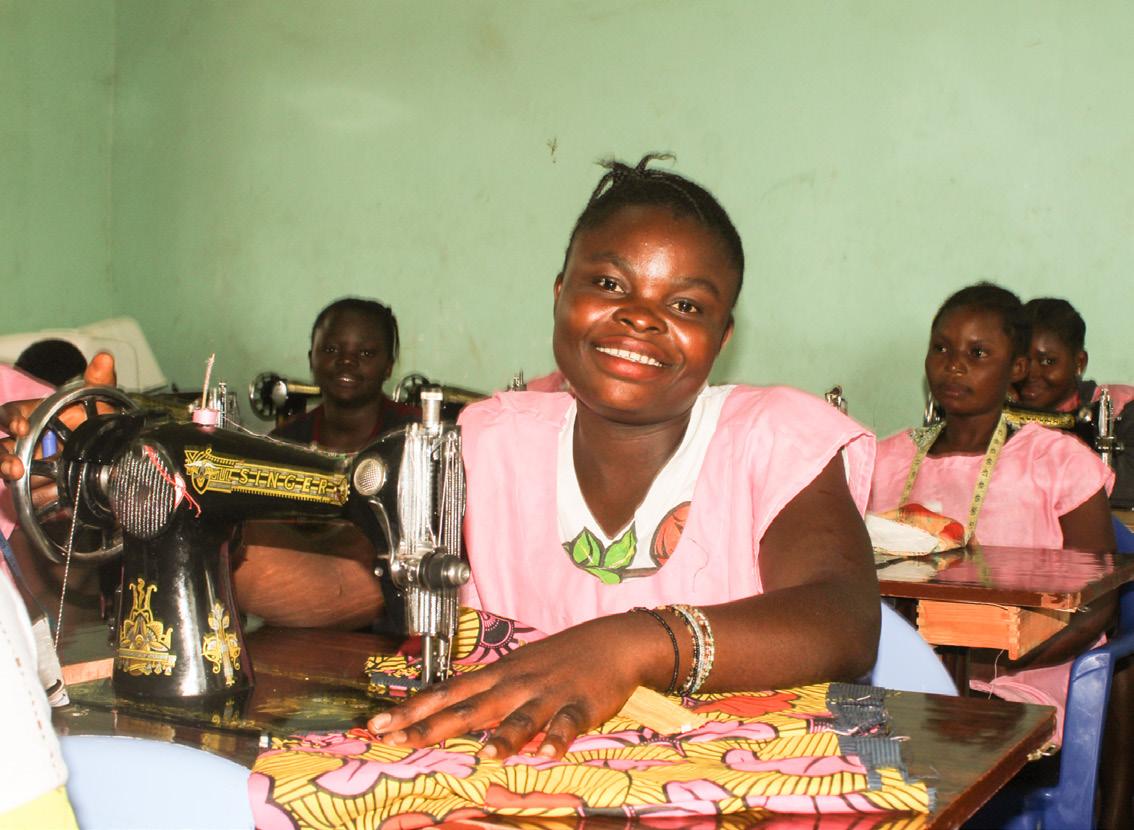
7 minute read
LASALLIANS RESPOND TO RACISM
BY ELIZABETH MOORS JODICE
“I CAN’T BREATHE.”
Advertisement
The last words of George Floyd reverberated throughout the world after his killing on May 25, 2020. The outrage and sadness that followed continues to be expressed in impassioned calls for justice and for change.
Floyd’s death in Minneapolis, Minnesota, has sparked renewed attention on systemic racism and racial injustice. His death amplified the names and circumstances surrounding the deaths of other Black men and women, including the recent killings of Ahmaud Arbery and Breonna Taylor, in addition to Trayvon Martin, Michael Brown, Eric Garner, Philando Castile, Sandra Bland and Tamir Rice. The most recent tragedies have led to protests, demonstrations, discussions, personal reflection and voices from all walks of life saying, “Enough is enough.” Ministries in the Lasallian Region of North America (RELAN) are responding to the call for racial justice, including initiating critical conversations about systemic racism, racial injustice and inherent biases not only in the larger society but also within our own walls. As part of this response, many ministries are taking a hard look at their own policies and curricula, while some BIPOC (Black, Indigenous, People of Color) students and alumni are sharing their own unique experiences and needed perspectives in those areas. There is an acknowledgment that more needs to be done for real change to happen.
In the spring, many ministry leaders released messages, speaking to the work ahead, such as the one from Sacred Heart Cathedral Preparatory in San Francisco, California, in which Melinda Lawlor Skrade, Ph.D., president, and Gary J. Cannon, Ed.D., principal, wrote, “Our Diversity, Equity, and Inclusion Working Group has been meeting weekly to discuss matters of inclusivity at SHC and a process to move forward. This team will help guide professional development for all staff next year. They will partner with school administration to promote equity and inclusion in academic, cocurricular and spiritual life. From these ongoing efforts, future goals and action steps will emerge, along with resources, to promote a culture of inclusion and respect throughout our entire campus and community.”
In his message, Brother James Butler, FSC, president of La Salle College High School in Wyndmoor, Pennsylvania, acknowledged the task ahead, writing, “You really do have to work at it. But we will have to work even harder at understanding. We can use abstract nouns like diversity and inclusivity—and even brotherhood—rather glibly then pat ourselves on the back and go away self-satisfied. Or we can do the hard, earnest work of trying to understand the experience of other people, despite the blinders race, culture, class, age, and education (too little or too much) may have slipped on us over time.”
An example of that work can be found at DeLaSalle High School in Minneapolis. Between 2015-2018, DeLaSalle worked with consultants to hold staff trainings on racial equity and how to incorporate more diversity into the school’s curriculum to reflect experiences of students. Dr. Roy Kay, English teacher, felt that the sessions fell short of expectations and that led him to create a Racial Equity Reading Group in 2018 for Black faculty and staff, which later expanded to all faculty and staff, with the goal of creating space for honest conversation. While the group has seen limited success, Dr. Kay plans to continue the effort and keep the conversation going.
“Fundamentally, we have to make a simple choice: either submit to and live the grand narrative of white supremacy and its perverse values that are deleterious to all or we must submit to and live the prophetic tradition that hears the cries of the oppressed and attends to repairing the world,” said Dr. Kay. “The reading group provides an opportunity for us to acquire the equipment we need to walk the talk and in so doing, the strength to repair ourselves and the world.”
Dr. Kay will discuss the reading group as one of four breakout sessions that will focus on racial justice at the virtual Huether Lasallian Conference, November 19-21. In another, Fred Trainer, retired counselor from De La Salle Vocational in Bensalem, Pennsylvania, will draw on his more than 40 years as a counselor to at-risk youth to help educators complement their instruction with character development training for their students. His session will focus on four areas that tie in today’s social justice actions with the Lasallian response. Trainer will lead a discussion that will challenge educators to help their students develop a critical consciousness, learn how to see and work with people within the context of their group identities, grow the use of critical thinking skills with integrity to create community, and assist students to form their identities in a way that allows them to see social inequities as part of the process of enacting constructive change.

Top row, from left, Hayden Greene, M.A. (Manhattan College), Kristi J. Kelly, Ed.D. (Lewis University), Maureen O’Connell, Ph.D. (La Salle University) and, bottom row, from left, Luisa Marcela Ossa, Ph.D. (La Salle University), served as panelists for the LACU livestream, with Brother Ernest Miller, FSC, D.Min. (La Salle University) and Frances Sweeney, Ph.D. (Saint Mary’s College of California) as the moderators.
“What are the specific tools that may link our students preparing them to engage the world in moving our whole community toward a more just society? Such ‘character building’ can only happen in authentic relationships with adults who understand their mission and who are not afraid to get their hands dirty,” shared Trainer. “If not us, who?”
Also inviting educators to action are initiatives put into place by the District of Eastern North America (DENA). Commissioned by Brother Dennis Lee, FSC, DENA Visitor, the District initiated a Racial Justice Coalition with the mission of inviting people to prayer, self-education and action regarding racial justice. The District has also hosted online “book conversation circles,” developed a comprehensive listing of resources, and relaunched its LET’S Talk series focused on contemporary social justice and advocacy.
Efforts to open worldwide Lasallian conversations came in the form of two livestream events: the June 25th Responding to Racism: A Lasallian Dialogue, hosted by the Lasallian Association of Colleges and Universities (LACU) in collaboration with the Office for Lasallian Education at Christian Brothers Conference, the District of Eastern North America, the Midwest District and the District of San Francisco New Orleans, followed by the September 24th Lasallian Dialogue on Racism: A Global Pandemic, hosted by the International Association of Lasallian Universities (IALU) in partnership with the World Union of Lasallian Former Students (UMAEL), the Secretariat of Solidarity and Development, and Young Lasallians. The dialogues aimed to discuss racism and how to act in response to systemic and institutional racism.
“My hope is that these dialogues and calls to prophetic action are crucial steps toward Lasallian schools, universities and other centers of education generating a sustained, critical conversation about transforming curriculum and the overall ethos of the educational community with an anti-racist critical pedagogy,” said Brother Ernest Miller, FSC, moderator for both dialogues, who serves as vice president for mission, diversity and inclusion at La Salle University. “Lasallians must undertake a critical inventory of self and institutions—the unexamined life is not worth living—to recollect how we perpetuate racial inequities and other systemic, interlocking injustices, and give witness to what the biblical vision of justice looks like.”
The dialogues continue the work of the annual Lasallian Higher Education Colloquy on Racial Justice, co-founded in 2017 by Brother Ernest and Brother Jack Curran, FSC, vice president for mission at Manhattan College. This annual gathering provides faculty and administrators opportunities to explore intersections of the struggle for racial justice and equity within the Lasallian heritage and mission and Catholic social teaching. The dialogues produced the Mission Mandated Lasallian Vision for Racial Justice, which offers recommendations for action and contemplation.
At Christian Brothers Conference, staff members have engaged in several discussions surrounding racism and discrimination by watching a series of films, followed by opportunities to talk about injustice. In addition, Lasallian Volunteers (LV) has committed to anti-racism training for staff and LVs. For the 2020-2021 service year, the program has hired an anti-racism facilitator to gather all LVs monthly to honor the program and staff’s commitment to working toward a more just society. Working toward a more just world is one effort Brother Superior General Robert Schieler, FSC, encouraged Lasallians to undertake in his June 5 letter to RELAN, written in response to the killing of George Floyd. “We know that racism, poverty and injustice are endemic in society,” he wrote. “These evils are not easily eradicated. Therefore, we persevere in our educational mission to bring about systemic change for more just and peaceful world for everyone.”
The many Lasallian responses to racism and injustice all share the common foundation of the charism of Saint John Baptist de La Salle and the mission of Lasallian education. Just as opening schools to give a human and Christian education to all was a radical and concrete response to inequity in 17th century France, today’s initiatives are seeking not simply to make a statement, but to make a difference in a way that addresses human dignity and justice. As Lasallians, we are called to make changes of heart and of living within ourselves, our ministries and our world.
To learn more about the Lasallian response to racism, visit to www.Lasallian.info/ Responding-to-Racism.
Elizabeth Moors Jodice is director of communications at Christian Brothers Conference.









